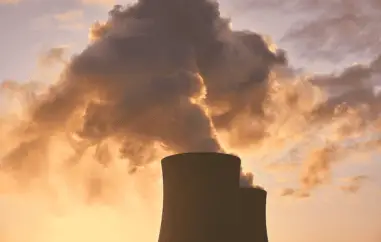Operation could save 1.3 million tons of CO2
 Continued operation of all three still-active nuclear power plants through March could save about 1.3 million metric tons of CO2, according to a report. "A stretch operation of the three nuclear power plants in operation, Isar 2, Neckarwestheim 2 and Emsland, beyond December 31, 2022, could lead to a decrease in coal-fired power generation in Germany in the first three months of 2023 in the amount of 1.2 terawatt hours," the "Neue Osnabrücker Zeitung" quoted Tuesday from a government response to a Union inquiry.
Continued operation of all three still-active nuclear power plants through March could save about 1.3 million metric tons of CO2, according to a report. "A stretch operation of the three nuclear power plants in operation, Isar 2, Neckarwestheim 2 and Emsland, beyond December 31, 2022, could lead to a decrease in coal-fired power generation in Germany in the first three months of 2023 in the amount of 1.2 terawatt hours," the "Neue Osnabrücker Zeitung" quoted Tuesday from a government response to a Union inquiry.
According to this, the generation of 1.2 terawatt hours of electricity from hard coal produces around 1.4 million tons of CO2, while nuclear power produces around 78,000 tons. According to the report, the Federal Ministry of Economics and Technology responded to a question from Jens Spahn (CDU), deputy leader of the CDU/CSU parliamentary group, by saying that if all three nuclear power plants were to continue operating, savings of a good 1.3 million tons of the greenhouse gas would be possible.
According to the plans of Federal Economics Minister Robert Habeck (Greens), only two nuclear power plants are to remain on the grid; the nuclear power plant in Lingen in Emsland is to be shut down. Spahn told the Neue Osnabrücker Zeitung: "Electricity is expensive because it has become scarce. That's why it's a serious mistake for the traffic light government not to leave all three nuclear power plants on the grid for another two years."
Instead, he said, even more coal-fired power plants in Germany and Europe would now have to be reconnected to the grid. The CDU politician demanded: "The Lingen nuclear power plant must also remain connected to the grid for the sake of the climate and energy security.
Image by Markus Distelrath









































